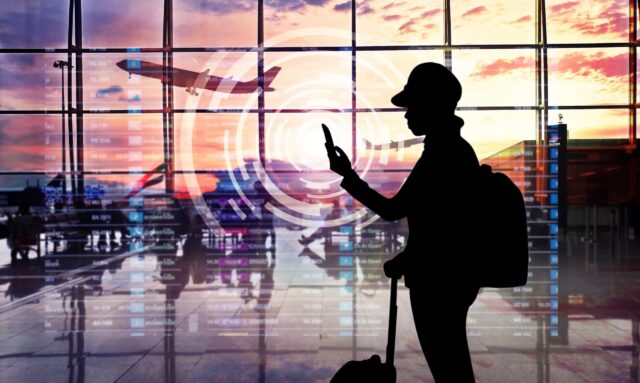easyJet secures £600m government loan
In today’s update, easyJet becomes one of the first companies to borrow from the government’s emergency coronovirus finance fund, but its founder says it will only stave off insolvency until…

In today’s update, easyJet becomes one of the first companies to borrow from the government’s emergency coronovirus finance fund, but its founder says it will only stave off insolvency until the end of 2020; Etihad is to trial a new contactless kiosk which can monitor passengers for early stages coronavirus symptoms, Thales puts in place a coronavirus adaption plan to bolster resilience, Air New Zealand makes 387 pilots redundant and Singapore’s Changi Airport closes one of its terminals.
easyJet secures £600m government loan
easyJet has become one of the first companies to use the government’s COVID-19 corporate financing fund, securing a £600m loan.
But the airline’s founder and biggest shareholder, Sir Stelios Haji-Ioannou, has claimed that even with the cash injection, the airline will run out of cash by the end of the year if it doesn’t cancel a £4.5 billion contract for new Airbus aircraft.
The airline will also borrow an additional £407m from commercial creditors to ensure liquidity. easyJet has grounded its entire fleet for at least April and May due to the COVID-19 pandemic.
Yesterday Haji-Ioannou, who, together with family members owns 34 per cent stake in the airline, demanded an emergency general meeting and called for the sacking of the budget carrier’s chief financial officer. The tycoon has stepped up his efforts for the termination of the 107 aircraft contact.
Haji-Ioannou claimed, before the announcement of the government loan, that the company would run out of money by August. He claims that when international travel eventually restarts, the airline would “feel more like a startup trying to find a few profitable routes for a few aircraft.”
A spokesman for Haji-Iannaou said that the government cash injection would not change the underlying situation and would only push the insolvency boundary back from August to “late-autumn, early winter.” easyJet is understood to be in talks with Airbus to review the £4.5bn contract.
Chief Executive of easyJet, Johan Lundgren, said: “We remain absolutely focused on ensuring the long-term future of the airline, reducing our costs and preserving jobs, to make sure easyJet is in the best position to resume flying once the pandemic is over.”
He added that airline had now reached agreements with unions to furlough UK-based pilots and crew with around 4,000 of 9,000 to be put on furlough during April and May.
Lundgren added: “Our current priority is to safeguard short-term liquidity … in the event of a prolonged grounding of the fleet.”
Haji-Ioannou received a near £60m share of £171m paid in dividends last month. He said he would not inject further equity into the carrier “whilst the Airbus liability is in place.”
Etihad to trial contactless kiosk to identify passengers with COVID-19
Etihad Airways will trial new contactless technology kiosk which will help it identify passengers with medical conditions, including early stages of the coronavirus.
The carrier is partnering with Australian technology firm Elenium Automation to test the new concept later this month at its Abu Dhabi hub.
The technology can “monitor the temperature, heart rate and respiratory rate of any person using an airport touchpoint,” including check-in, immigration, or bag-drop.
Should a passenger show signs of illness, the system will automatically suspend check-in or bag-drop. It would then alert qualified staff who could make a further assessment and manage travellers as appropriate.
But the carrier stressed that the innovation was not a diagnostic tool. Etihad vice president for hub and midfield operations Jorg Oppermann said: “This technology is…an early warning indicator which will help to identify people with general symptoms, so that they can be further assessed by medical experts, potentially preventing the spread of some conditions to others preparing to board flights to multiple destinations.”
Elenium has also developed hands-free technologies using voice recognition to perform certain self-service tasks to minimise the potential of viral or bacterial transmission.
Thales strengthens resilience against coronavirus impact
Thales has announced the implementation of a global adaptation plan in response to the COVID-19 pandemic.
The company has completed an additional €2 billion syndicated credit facility, withdrawn its final dividend proposal, with a cash value of €430 million and withdrawn its 2020 financial outlook
Thales’ Chairman and Chief Executive Officer Patrice Caine said Thales’ first priority would remain the implementation of measures necessary to preserve the health of its employees and their relatives, customers and the wider population at large in the countries it operates in.
Caine added “direct exposure” to the most affected markets was limited with civil aeronautics businesses only representing around 12 per cent of the Group’s turnover. But he added the crisis was causing “serious disruption” to production chains and project execution which heightened the need for implementation of the global adaptation plan.
He added: “The remarkable mobilisation of our teams, combined with our unique positioning, built on a portfolio of key technologies in critical domains, a diversified customer base and a strengthened balance sheet, will be structural assets to mitigate the effects of this unprecedented crisis.”
The measures also include deferral of non-critical investments in R&D and real estate, significant reduction in discretionary spending on marketing, travel and external consultants and strengthening of actions to control working capital requirements, in particular to take into account the impact of the crisis on demand and supply chains.
Boeing extends Seattle production halt “until further notice”
Boeing is extending a halt in production at its Seattle-area factories “until further notice”, enabling the manufacturer to improve its defences against coronavirus.
The company plans to implement additional measures to protect employees upon their eventual return including visual cues to encourage physical distancing, more frequent and thorough cleaning of work and common areas, and staggering shift times to reduce the flow of employees arriving and departing. Boeing will also use the extra time to assess the “reliability” of its supply chain.
Air New Zealand to lay off 387 pilots
Air New Zealand is planning to make 387 pilots redundant amid the coronavirus crisis according to the New Zealand Air Line Pilots’ Association (NZALPA).
The carrier’s chief executive Greg Foran and his executive team met with the union’s team yesterday to discuss cost-cutting measures.
“NZALPA was told by Air New Zealand that they proposed to make 387 pilots redundant as ‘the most economically efficient surplus’ resulting from the proposed Air New Zealand flight schedule,” NZALPA president Andrew Ridling said.
The union said it would negotiate to lower that number and finalise the agreement process. It also wants Air New Zealand to set out conditions for pilots to return.
Air New Zealand has slashed 95 per cent of its flights and agreed a standby government loan as it battles the drop in demand. It expects to come out of the pandemic as a smaller airline and announced plans to lay off 3,500 of its 12,500-strong workforce last week.
Changi Airport closes terminal
Singapore’s Changi airport is closing its Terminal 2 for 18 months from May 1 due to the dramatic fall in air traffic.
Transport minister Khaw Boon Wan told parliament yesterday that the impact on Changi was “severe”, describing the four terminal airport as “deserted”.
He said: “Right now one terminal is enough to handle the current volume of demand. We can close down one or two terminals. But we must think about post-pandemic recovery.”
The move will enable the airport operator, retail tenants, airlines and ground handlers to save on running costs. Singapore Airlines will consolidate its operations at Terminal 3.
















